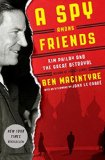Summary | Excerpt | Reviews | Beyond the Book | Readalikes | Genres & Themes | Author Bio

Critics' Opinion:
Readers' Opinion:
First Published:
Jul 2014, 384 pages
Paperback:
May 2015, 384 pages
 Book Reviewed by:
Book Reviewed by:
Kim Kovacs
Buy This Book
Elliott could never recall exactly where their first meeting took place. Was it at the bar in the heart of the MI6 building on Broadway, the most secret drinking hole in the world? Or perhaps it was at White's, Elliott's club. Or the Athenaeum, which was Philby's. Perhaps Philby's future wife Aileen, a distant cousin of Elliott's, brought them together. It was inevitable that they would meet eventually, for they were creatures of the same world, thrown together in important clandestine work, and remarkably alike in both background and temperament. Claude Elliott and Philby's father, St John, a noted Arab scholar, explorer, and writer, had been contemporaries and friends at Trinity College, and both sons had obediently followed in their academic footsteps—Philby, four years older, left Cambridge the year Elliott arrived. Both lived under the shadow of imposing but distant fathers whose approval they longed for and never quite won. Both were children of the empire: Kim Philby was born in the Punjab when his father was a colonial administrator; his mother was the daughter of a British official in the Rawalpindi Public Works Department. Elliott's father had been born in Simla. Both had been brought up largely by nannies, and both were unmistakably molded by their schooling: Elliott wore his Old Etonian tie with pride; Philby cherished his Westminster School scarf. And both concealed a certain shyness, Philby behind his impenetrable charm and fluctuating stammer, and Elliott with a barrage of jokes.
They struck up a friendship at once. "In those days," wrote Elliott, "friendships were formed more quickly than in peacetime, particularly amongst those involved in confidential work." While Elliott helped to intercept enemy spies sent to Britain, Philby was preparing Allied saboteurs for insertion into occupied Europe. They found they had much to talk about, within the snug confines of absolute secrecy.
The void in Elliott's life left by the death of Basil Fisher was filled by Philby. "He had an ability to inspire loyalty and affection," wrote Elliott. "He was one of those people who were instinctively liked but more rarely understood. For his friends he sought out the unconventional and the unusual. He did not bore and he did not pontificate." Before the war, Philby had joined the Anglo-German Fellowship, an organization with pro-Nazi leanings, but now, like Elliott, he was committed to battling "the inherent evil of Nazism." The two friends "very rarely discussed politics" and spent more time debating "the English batting averages and watching the cricket from the Mound Stand at Lord's"—home to the Marylebone Cricket Club, the central citadel of cricket, of which Elliott was a member. Philby seemed to share Elliott's firm but simple British loyalties, uncomplicated by ideology. "Indeed," wrote Elliott, "he did not strike me as a political animal." Philby was only twenty-eight when they met, but to Elliott he seemed older, matured by his experience of war, confident, competent, and agreeably louche.
MI6 enjoyed a reputation as the world's most redoubtable intelligence agency, but in 1940 it was in a state of flux, rapidly reorganizing under the pressure of war. Philby seemed to bring a new air of professionalism to the job. He was plainly ambitious but hid his drive, as English manners required, behind a "pose of amiable, disengaged worldliness."
Hugh Trevor-Roper was another new recruit to wartime intelligence. One of the cleverest and rudest men in England, Trevor-Roper (later the historian Lord Dacre) had hardly a good word for any of his colleagues ("by and large pretty stupid, some of them very stupid"). But Philby was different: "An exceptional person: exceptional by his virtues, for he seemed intelligent, sophisticated, even real." He appeared to know exactly where he was going. When Philby spoke about intelligence matters, Elliott thought he displayed impressive "clarity of mind," but he was neither drily academic nor rule-bound: "He was much more a man of practice than of theory." Philby even dressed distinctively, eschewing both the Whitehall stiff collar with pinstripe and the military uniform to which, as a former war correspondent, he was entitled. Instead, he wore a tweed jacket with patches at the elbows, suede shoes, and a cravat, and sometimes a coat of green fabric lined with bright red fox fur, a gift from his father, who had received it from an Arab prince. This eye-catching outfit was topped off with a homburg and a smart, ebony-handled umbrella. Malcolm Muggeridge, another writer recruited to wartime intelligence, noted Philby's unique sartorial swagger: "The old Secret Service professionals were given to spats and monocles long after they passed out of fashion," but the new intake of officers could be seen "slouching about in sweaters and gray flannel trousers, drinking in bars and cafés and low dives . . . boasting of their underworld acquaintances and liaisons. Philby may be taken as a prototype and was indeed, in the eyes of many of them, a model to be copied." Elliott began to dress like Philby. He even bought the same expensive umbrella from James Smith & Sons of Oxford Street, an umbrella that befitted an establishment man of the world, but one with panache.
Excerpted from A Spy Among Friends by Ben Macintyre. Copyright © 2014 by Ben Macintyre. Excerpted by permission of Crown. All rights reserved. No part of this excerpt may be reproduced or reprinted without permission in writing from the publisher.




A book may be compared to your neighbor...
Click Here to find out who said this, as well as discovering other famous literary quotes!
Your guide toexceptional books
BookBrowse seeks out and recommends the best in contemporary fiction and nonfiction—books that not only engage and entertain but also deepen our understanding of ourselves and the world around us.